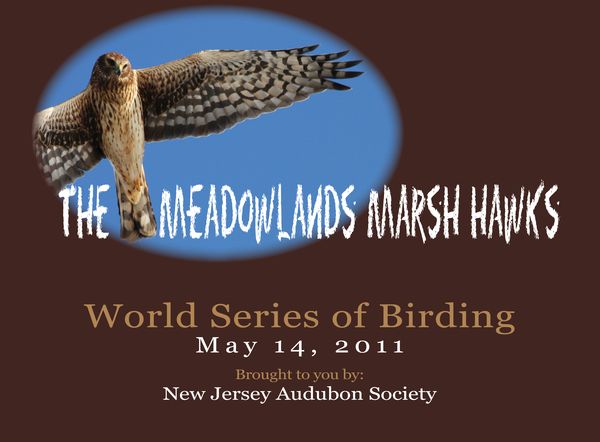
Just a reminder: The Meadowlands Commission has fielded a great team for our first foray into the World Series of Birding, on Saturday, May 14, and we could use your help.
More info follows.
The Meadowlands Marsh Hawks will be exploring every nook and cranny in Bergen County in search of as many bird species as we can.
Your pledge on the number of species of birds seen by the Marsh Hawks will help support bird research projects in the Meadowlands and continue assisting students from Ramapo College of New Jersey gain invaluable experience working with and for conservation efforts in the Meadowlands.
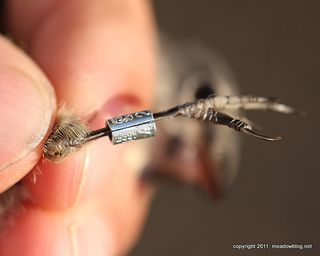 For example, if 120 species are found and your donation is for $.20/species then the donation towards our research and education program would be $24. Donations may be tax-deductible.
For example, if 120 species are found and your donation is for $.20/species then the donation towards our research and education program would be $24. Donations may be tax-deductible.
Download a pledge form here: Download Pledge sheet
After the conclusion of the World Series of Birding, we will send you a complete list of the birds counted and a letter documenting your generous donation.
Donations to the Marsh Hawks will go to support the N.J. Meadowlands Commission Landfill Bird Banding Project, which has been a great educational tool for Ramapo College of New Jersey students in recent years.
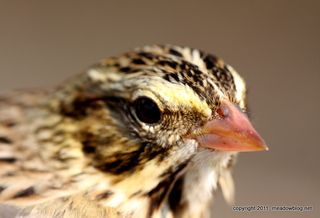 Grassland bird populations are in steep decline due to loss of habitat and poor management practices. The same habitat required for breeding by these species will also provide habitats for migrating and wintering songbirds.
Grassland bird populations are in steep decline due to loss of habitat and poor management practices. The same habitat required for breeding by these species will also provide habitats for migrating and wintering songbirds.
These habitats are crucial as grassland birds, including several threatened and endangered species, need to stop and refuel to make it to there their wintering and breeding destinations. A capped landfill can be a great resource for wildlife if managed correctly because it is an open space that needs to be planted due to runoff and erosion control.
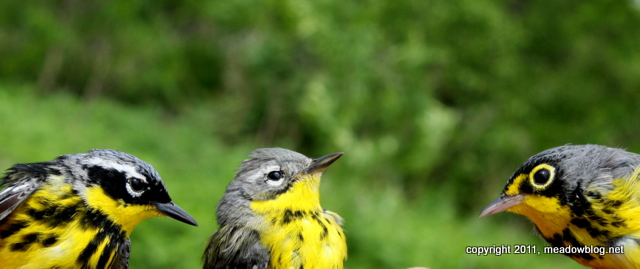
For the past three years we have been monitoring migratory birds on the Erie Landfill and the nearby restored wetland Harrier Meadow. The data that has been collected is invaluable as we are learning which microhabitats on capped landfills birds prefer during spring and fall migrations.
We are also seeing positive and negative trends in the population of certain species (some are endangered or threatened in N.J.) that could be affected by several factors such as food resources, weather, and habitat loss. There are very few long-term studies that focus on migrating grassland bird populations in N.J.
The study site is located just 5 miles west of New York City. This urban environment can be extremely important as a stopover site for many songbirds. The recapture data that we have collected proves just that.
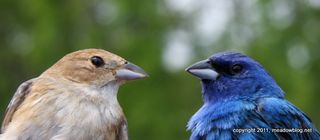 We have recaptured hundreds individuals representing several species including; Savannah Sparrow, Song Sparrow, Indigo Bunting, Yellow-rumped Warbler, and Blackpoll Warbler.
We have recaptured hundreds individuals representing several species including; Savannah Sparrow, Song Sparrow, Indigo Bunting, Yellow-rumped Warbler, and Blackpoll Warbler.
By looking at length of stay and body condition changes, we can determine the importance of the Meadowlands and places similar to areas such as this.
This recapture data also shows how important the Meadowlands are to breeding and migrant birds because of site fidelity. Many birds that were banded in the spring of 2008 were recaptured in the fall of 2010. We have also caught several migrant birds in different years
The educational aspect that is as equally important as the biological aspect. The Meadowlands Commission has been collaborating with Ramapo College of New Jersey. Students from their environmental science program have been interning with us to fulfill requirements for the co-op program.
These students are gaining experience in the field working with scientists and then preparing themselves for a master’s degree by going through the same steps as with a master’s thesis.
This project has also started a volunteer core for the Commission that has not only helped us with our research, but has also brought in people to help with other projects as well.
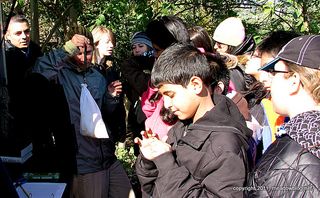 These volunteers also gain experience that can help them in their environmental careers. We have also had banding demonstrations for several elementary school groups from various local towns and also from several universities.
These volunteers also gain experience that can help them in their environmental careers. We have also had banding demonstrations for several elementary school groups from various local towns and also from several universities.
Hundreds of kids and adults have had a chance to watch the banding process and learn about bird biology by coming to banding demonstrations for classes, during bird walks, and for the annual Meadowlands Festival of Birding.
Keeping this project going is important in many ways. Any funding brought in by the World Series of Birding will go toward supplies needed for the banding project. The mist nets we have been using for several seasons are becoming worn, and new nets are needed. Other various supplies, such as poles, are needed as well.
Thank you for your help!
